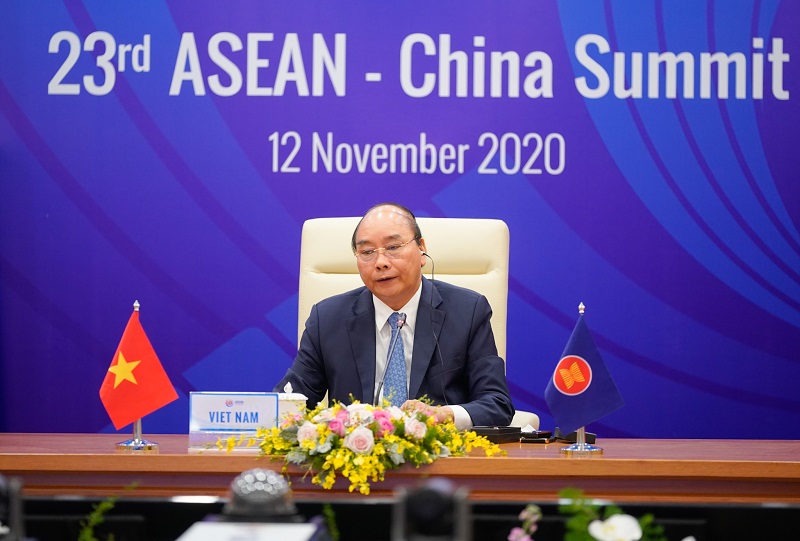ASEAN reaffirms position on keeping East Sea peaceful
The 10-member bloc demands the code of conduct (COC) in the South China Sea (called East Sea by Vietnam) be effective and substantive.
The South China Sea issue is high on the 37th ASEAN Summit’s agenda, and the 10-member bloc has shown its determination to maintain peace, stability, and security in the sea that Beijing claims the vast majority.
Vietnam's Prime Minister Nguyen Xuan Phuc at the ASEAN-China Summit on November 12. Photo: Quang Hieu |
At the 23rd ASEAN-China Summit on November 12, ASEAN expressed a strong commitment to turning the South China Sea, a critical sea lane of the region and the world, into a sea of peace, stability, security and safety for the free flow of goods.
The 10 ASEAN nations agreed that differences and disputes should be settled through peaceful means, the rule of law must be fully respected and observed, and common values are upheld, local media reported.
Speaking at the summit, Vietnam’s Prime Minister Nguyen Xuan Phuc, the Chair of ASEAN 2020, reaffirmed the bloc's position on the South China Sea issue was clearly stated at the 36th ASEAN Summit in June 2020, the 53rd ASEAN Foreign Ministers’ Meeting in September 2020, and the on-going 37th ASEAN Summit.
He underscored the importance of the 1982 United Nations Convention for the Law of the Sea (UNCLOS) as the legal framework that governs all activities in oceans and seas.
The Vietnamese PM emphasized that the two sides need to fully implement the Declaration of the Conduct (DOC) of Parties in the South China Sea and looks forward to the early conclusion of the code of conduct (COC) that is effective, substantive and consistent with international law, particularly the 1982 UNCLOS.
In 2019, ASEAN and China completed the first reading of the draft of the COC that was announced at the ASEAN Ministerial Meeting in Singapore a year earlier.
The South China Sea – a crucial passage for a significant portion of the world’s commercial shipping – is bordered by Brunei, Cambodia, China, Indonesia, Malaysia, the Philippines, Singapore, Taiwan, Thailand, and Vietnam.
China claims roughly 90% of the sea, which encompasses an area of around 3.5 million square kilometers (1.4 million square miles).
Mr. Phuc noted that as an economic power, China is always highly appreciated in terms of contribution to global peace, stability, and development.
At the summit, ASEAN member states and China also discussed measures to boost cooperation in the post-pandemic era for further bilateral trade, mostly in 2021 when the two sides mark the 30th anniversary of the establishment of relations.
The two sides agreed to launch the newly-approved Plan of Action for the 2021-2025, to boost inter-commercial link, maintain the regional supply chain, and to promote the ASEAN-China free trade agreement, digitalization, cybersecurity, and digital economy.












